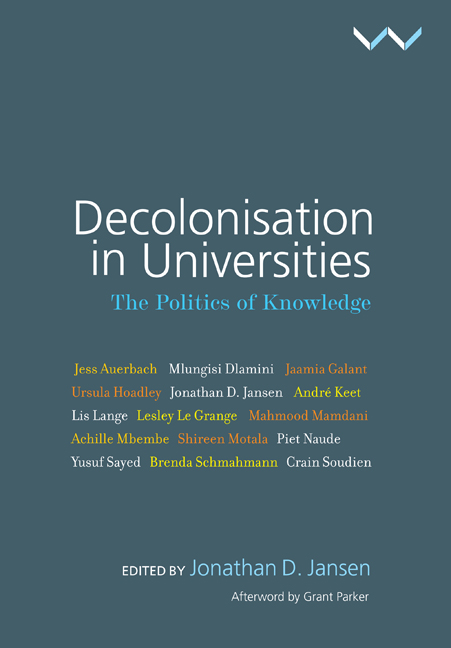Book contents
- Frontmatter
- Contents
- List of Figures
- Acronyms and Abbreviations
- Introduction and Overview: Making Sense of Decolonisation in Universities
- PART 1 THE ARGUMENTS FOR DECOLONISATION
- PART 2 THE POLITICS AND PROBLEMS OF DECOLONISATION
- PART 3 DOING DECOLONISATION
- PART 4 REIMAGING COLONIAL INHERITANCES
- Chapter 9 Public Art and/as Curricula: Seeking a New Role for Monuments Associated with Oppression
- Chapter 10 The Plastic University: Knowledge, Disciplines and the Decolonial Turn
- Chapter 11 Decolonising Knowledge: Can Ubuntu Ethics Save Us from Coloniality? (Ex Africa Semper Aliquid Novi?)
- Chapter 12 Future Knowledges and Their Implications for the Decolonisation Project
- Afterword: Decolonising Minds via Curricula?
- Contributors
- Index
Chapter 10 - The Plastic University: Knowledge, Disciplines and the Decolonial Turn
from PART 4 - REIMAGING COLONIAL INHERITANCES
Published online by Cambridge University Press: 25 October 2019
- Frontmatter
- Contents
- List of Figures
- Acronyms and Abbreviations
- Introduction and Overview: Making Sense of Decolonisation in Universities
- PART 1 THE ARGUMENTS FOR DECOLONISATION
- PART 2 THE POLITICS AND PROBLEMS OF DECOLONISATION
- PART 3 DOING DECOLONISATION
- PART 4 REIMAGING COLONIAL INHERITANCES
- Chapter 9 Public Art and/as Curricula: Seeking a New Role for Monuments Associated with Oppression
- Chapter 10 The Plastic University: Knowledge, Disciplines and the Decolonial Turn
- Chapter 11 Decolonising Knowledge: Can Ubuntu Ethics Save Us from Coloniality? (Ex Africa Semper Aliquid Novi?)
- Chapter 12 Future Knowledges and Their Implications for the Decolonisation Project
- Afterword: Decolonising Minds via Curricula?
- Contributors
- Index
Summary
The idea of the ‘the plastic university’ suggests a straightforward proposal: the university's essence is transformability. In the context of present debates on knowledge and curriculum within South African universities, this idea signifies a decolonial undertaking, an excavation of sorts. Such shovelling is an uneasy and awkward task given the present over-proximity of the decolonial discourse (Keet 2017) in South African higher education. While draping and masking much of the necessary contestations that need to emerge, the immediacy of the decolonial academic ‘chatter’ and ‘clutter’ since the #MustFall movements, which took shape from 2015 onwards, is performing itself as a collective existential crisis within the academy.
Thus, to retrieve itself, the academy in South Africa had to produce the ‘decolonial’ as the reigning epithet, as in decolonial pedagogies, and decolonial this or that. The upshot of these decolonial adventures is the systematic evasion of engagement with the nature and politics of disciplined knowledge, and how it constitutes the university and its practices. A classic case in point of shallowing the debates is the message in Jenna Etheridge's (2018) newspaper article ‘Decolonising Education: How One SA University Is Getting It Done’, which focusses on Stellenbosch University. That is, the academy seldom reflects on the transformative resources embedded within the disciplines and the concomitant knowledges with which they work. For this reason, the academy, for the most part, simply grasps transformation work as a series of interventionist strategies. By superimposing these approaches on the plastic transformability of knowledge and teaching and learning, transformation strategies run the risk of being counter-productive.
This chapter argues for an interpretive orientation that can sense the ‘origin’ of the university, from which it has detached itself, as plastic; that is, flexible, malleable, with an inscribed transformative ability rooted in the ‘nature’ of the knowledge and the disciplines with which it works. To wit, the university's essence is transformability. As our ways of disciplining the university have concealed this essence, the decolonial turn, in my reading, is a call to excavate and recover the innate plasticity of the university, which speaks to a kind of unburdening of epistemic freedom as a key notion in any definition of the decolonisation of knowledge.
- Type
- Chapter
- Information
- Decolonisation in UniversitiesThe Politics of Knowledge, pp. 202 - 216Publisher: Wits University PressPrint publication year: 2019

